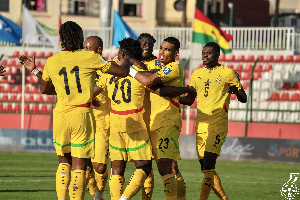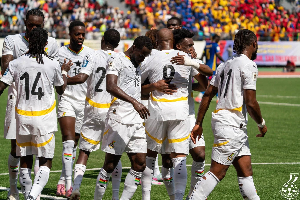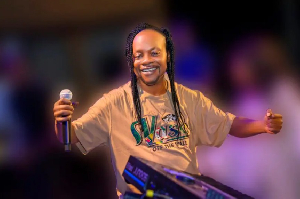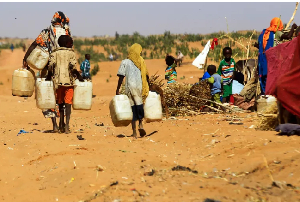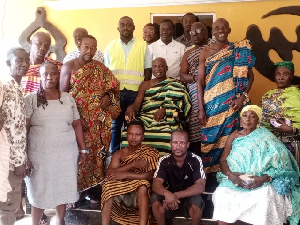BY: GABBY ASARE OTCHERE-DARKO
After reading Ekwow Spio-Garbrah’s 1,940-word article, “PRESIDENT ATTA-MILLS IS RIGHT ON COTE D’IVOIRE”, I summed up my impression in this wall-posting on my Facebook: “Poor Spio-Garbrah, he manufactures his own version of the NPP stance on La Cote d'Ivoire, damns it and uses it as a basis to spio himself back into Millsian relevance. It must be cold out there - opposition while in government must be hell!”
Dr Spio-Garbrah wrote in his article published on Thursday, 27 January: “The same New Patriotic Party (NPP), which in the 1960s called for a ‘constructive engagement’ with Apartheid South Africa, today calls for war on our neighbour Cote d'Ivoire to resolve a simple internal electoral dispute. Such a reckless gun-toting policy of the NPP will not be faithful to the Ghana Constitution or be keeping with either the theory or practice of international relations.”
Where has the New Patriotic Party called for war on Ghana’s neighbour Cote d’Ivoire? In fact, who in Ghana has called for war? So, why would a leading politician of the former Cabinet Minister’s standing invent such a fact and write a whole article to furnish it?
He could have defended President JEA Mills’ position on La Cote d’Ivoire to perfection and left it at that. But, such is the adversarial nature of our politics that the write did not feel it complete without criticizing the position of the opposition party. But, did he really focus on the position of the opposition? No!
It is this kind of thing that leads the likes of Sammy Okudzeto Ablakwa to unfairly (perhaps) accuse Dr Spio-Garbrah of “naked opportunism”.
Rather than his comments being seen as constructive to efforts towards finding a resolution to the crisis, the author now stands accused of using it to reposition himself within the sight and hearing of the presidency. Where he went wrong, fundamentally, was to invent a position, one which is easily condemnable, present it as the position of the opposition, accuse the NPP with it, and turn around to criticize that position. It is as if on this foreign policy issue, rather than drinking from the informed fountain of knowledge, Spio just gargled.
But, it seems he still does not get it. In a radio interview on Friday, January 28, the NDC Vice Chairman said, “I have made it clear that in this case I am writing as an ordinary Ghanaian citizen and also because I have worked in La Cote d’Ivoire so I know the country…”
But, the import of his article is not about his apparent knowledge of the country. What it exposes is his absolute unknowingness of the NPP position on the matter.
Leaders who are quick to form a conclusion without the right information merely inform us of their leadership infirmity.
Arguably, in his eagerness to please Mills he chose to rely on the propaganda about the NPP ‘position’ rather than to find out for himself what the stated NPP position has been.
Dr Spio-Garbrah has the penchant to use words but eloquence with the English language is not a guaranteed indication of the keenness of one’s mind. His point that, “the opposition New Patriotic Party (NPP), under the leadership of Nana Akufo-Addo, has decided to mount their 2012 election campaign on a radical new non-African doctrine that mimics the George W. Bush-inspired democracy-at-the-barrel-of- a-gun policy” may sound good in the ears of the victims of propaganda, but what does it mean?
Any discerning analyst can argue that the NPP is inherently skeptical about President Mills’ sincere commitment to the international efforts to get rid of Laurent Gbagbo and this may account for their consistent pressure on the President to come clean and firm. But that does not translate into an advocacy for war.
The official position of Ghana, ECOWAS, AU and the UN, as fully endorsed by the NPP is simply to not allow Laurent Gbagbo’s democracy-at-the-barrel-of-a-gun policy to overthrow the expressed preference of the majority of the Ivorian people. The conduct of Gabgbo is a de facto coup d’etat.
The more one reads Spio’s piece the more one feels the need for him also to give the kind of compos mentis reassurance offered by Koku Anyidoho when the latter released a purported letter ‘vindicating’ the President’s ‘long-espoused’ position that ‘military option is no option’ in the push to resolving the Ivorian crisis.
Dr Spio-Garbrah claimed, “The NPP has been telling Ghanaians that its new radical policy is rather what has been truly the mainstay of Ghanaian foreign policy practice. They argue that the measured, constitutionally and historically proper policy of President Atta-Mills and the NDC government is misguided. Where does the NPP get these notions from?”
Hello? The question that needs to be asked, rather, is this: from where does Ekwow Spio-Garbrah get these notions of the NPP? It is a very embarrassing attempt by a diplomat of his purported calibre at stating an opinion on such a critical matter about regional security.
Reminding readers of his experience in diplomacy, he said, “as a former Ghanaian diplomat myself, it would be unconscionable for me to sit unconcerned for the NPP to goad Ghana into a needless, reckless and potentially tragic war.”
It is reckless to invent a position for your political opponents on an issue of regional security. Apart from his claim being categorically false, since when has an opposition party goaded a nation into any war against another sovereign nation?
After taking such a joyride on the meandering roads of the English language, he stated, “The military option always exists for the UN and ECOWAS, but it cannot be Ghana's unilateral priority.”
Lord have mercy! Who said it should be Ghana’s unilateral priority, sir? So, really, what was the point of the Spio piece?
What has been the NPP position? Akufo-Addo said on December 17, “Conflict and instability in La Cote D’Ivoire pose a threat not only to the peace and stability of West Africa, but also to Ghana’s national security. Ghana shares a 700km border with La Cote D’Ivoire and our nation is an obvious haven for refugees from La Cote D’Ivoire... These are some of the reasons why Ghana cannot afford to stand by and watch helplessly as La Cote D’Ivoire is plunged into another cycle of bloodshed, conflict and division.”
While this is a clear departure from the Dzi wo fie asem (‘mind your own business’) foreign policy of Mills, the NPP has been consistent in respectfully urging the President to use his well-known “good relations with former President Laurent Gbagbo [and] his good offices to intervene with former President Gbagbo to ensure that the will of the Ivorian people is respected and that the position of the international community, as expressed by the position of ECOWAS at a meeting at which His Excellency the President was present, the Africa Union, and the United Nations Security Council, is respected.”
This means the NPP has connected itself to the position of ECOWAS. ECOWAS is a body where Ghana has traditionally been one of the most respected and strong voices and we have been very instrumental in shaping its decisions right from the 1970s.
It may be worth asking whether or not we are waning in our ability to influence the position of the regional body, when statements are made which can be seen as undermining the agreed regional position. It leads to speculations that even where we know we have a very solid point our President is unable to persuade his colleagues of it.
Dr Spio-Garbrah ought to have come across the position of the NPP presidential candidate that, “Everything should be done to avoid the spectre of La Cote D’Ivoire descending into the status of a rogue state whose leaders act in defiance of domestic and international law. Bloodshed and chaos should not be the price for an individual seeking to remain in office at all cost.”
This position was repeated at the January news conference by Jake Obestebi-Lamptey, the party chairman, who said, “Let me repeat, ‘Bloodshed and chaos should not be the price for an individual seeking to remain in office at all cost.’ Yet, it has been said by NDC propagandists that the NPP are warmongers, calling for our boys in green to be sent to the slaughter for a ‘needless war.’ The NPP position is not what is controversial. What is controversial is the oscillating diplomacy being artlessly exhibited by the Mills-Mahama administration.”
Mr Obetsebi-Lamptey went on to say, “The NPP position is consistent with the Ecowas position, which the Ghana government is a signatory to, and consistent with the AU and UN position. We believe Gbagbo’s removal is non-negotiable. What is negotiable is how that should be achieved.”
The NPP position can be summed up by the last sentence, Gbagbo’s removal is non-negotiable. What is negotiable is how that should be achieved. As to how this can be translated by any intellectual as gung-ho is extremely perplexing.
What Dr Spio-Garbrah has done is to set his own questions for the NPP, proceed to answer them his own way and on his own terms and mark the very answers he has given as not good enough. It is digressive and palaverous in its redundancy as a contribution to the debate on how to resolve the Ivorian crisis.
For instance, he makes the periphrastic point that before Ghanaian troops are deployed anywhere, President Mills is required by Article 214 (1) of the Constitution to consult the “Armed Forces Council [which] shall advise the President on matters of policy relating to defense and strategy including the role of the Armed Forces.”
He adds, with the miscarried confidence of a misguided advocate, that “President Atta-Mills says he has consulted the Armed Forces Council and they have advised him against an invasion.”
But, this is not an issue because the NPP has not come out to throw a challenge against the claim from the President that the capacity of Ghana’s armed forces is overstretched. They may doubt the sincerity of this claim based on the conflicting signals from the President but they have never challenged the claim of lack of capacity.
Indeed, Akufo-Addo went as far as to support the position of the President when he was asked the specific question (by three reporters at the news conference) would he have committed Ghanaian troops to Cote d’Ivoire were he the President.
His response was that it was a decision that a President does not take in isolation. It would be informed, normally, by recommendations from the state’s military commanders.
So how useful are the following questions from Dr Spio-Garbrah: “Does the NPP want the president to violate the Constitution? Does the NPP want the president to commit an impeachable offense? Where in the treaty setting up the Economic Community of West African States does it require all its members to form a mini NATO to invade fellow African countries?”
Would this question not be better addressed to the President of the Republic who appended his signature to the ECOWAS communiqué of December 24, which ruled in the use of ‘legitimate force’, but as a last resort?
It is clear from the NPP that what they are uncomfortable about is Ghana’s seeming isolationist position. Even if the President’s position is the right one it is one that should be persuasively made at the regional or continental body (AU at the weekend). Indeed, it is said that Ghana and Nigeria are to ECOWAS what Germany and France were to the European Economic Community (now European Union). We should bring that long-standing influence to bear.
A point made by the NPP, which, unfortunately, has been lost in the debate so far, is the party’s contention that “the isolationist position that is apparently adopted by President Mills is what rather endangers, not only Ghanaians soldiers, but the estimated 1.5 million Ghanaians who have made Cote d’Ivoire their home.”
According to the party, “Millions of people in la Cote d’Ivoire are looking up to us and the other ECOWAS states to act together to bring a peaceful end to the crisis.”
Dr Spio-Garbrah may be happy defending the organized hypocrisy of the old discredited Westphalian concept of sovereignty, which the erstwhile OAU practiced it even better than the European nations that created it in 1648 at the end of the Thirty Year War.
Stephen D. Krasner has called the Westphalian model a system of "organized hypocrisy," and right he is, because states have never stopped interfering in the domestic affairs of other states -- especially when they had the appropriate clout.That old principle of nonintervention has been rejected by the new African order.
As put aptly by the NPP, the Ivorians are not asking Ghanaians to choose their leader for them. They did that on November 28. They are only asking us to help them put into office the leader that they themselves have democratically chosen, a choice that the international community has wholeheartedly welcomed.
“Does the NPP want the president to disregard his oath and ignore the prospect of a potential reprisal attack on the nearly 1 million Ghanaians who live in Cote d'Ivoire? Is the NPP not aware that already marauding militias are roaming the streets of Abidjan and have been accused by the UN of even killing armed peacekeepers?” are some of the Spio questions.
It is the position of the Danquah Institute that we risk moving into a more dangerous conflict management mode if efforts are not doubled and accelerated to resolving the crisis. Intelligence reports continue to point to growing rebel activities. What could they be preparing for if not for an armed conflict. But, let us focus more robustly on what could make nonsense of their preparations?
63% of the army vote is said to have gone to Ouattara, not Gbagbo, on November 28. It should not be taken for granted that Prof Gbagbo could count on the loyalty of the majority of the nation’s army army. For how long may we count on the patience of the rebels and the majority of the Ivorian people? And, how would that affect ‘isolationist’ Ghana’s interest?
In 2006, in announcing his candidacy for his party’s leadership, Dr Spio-Garbrah had this to say: “I have refrained from making any definitive pronouncements during the period when I have been undergoing self-assessment, in deference to the Biblical principle that: A fool uttereth all his mind, but a wise man keepeth it in till afterwards, says Proverbs 27.20.”
How some of us wish he reversed to heeding this creed, indeed.
The author is the Executive Director of the Danquah Institute, a policy think tank. gabby@danquahinstitute.org
Opinions of Monday, 31 January 2011
Columnist: Otchere-Darko, Gabby Asare


